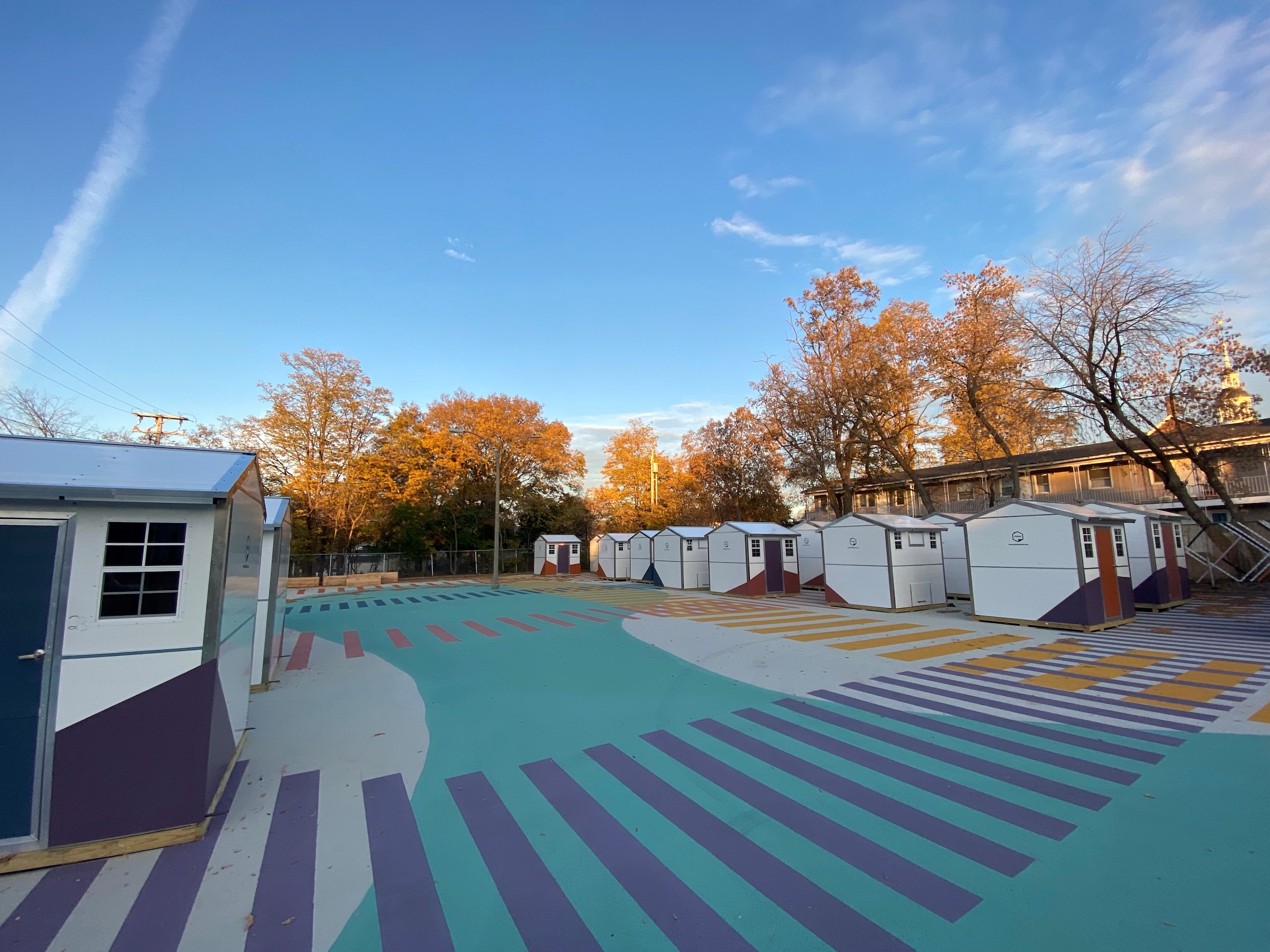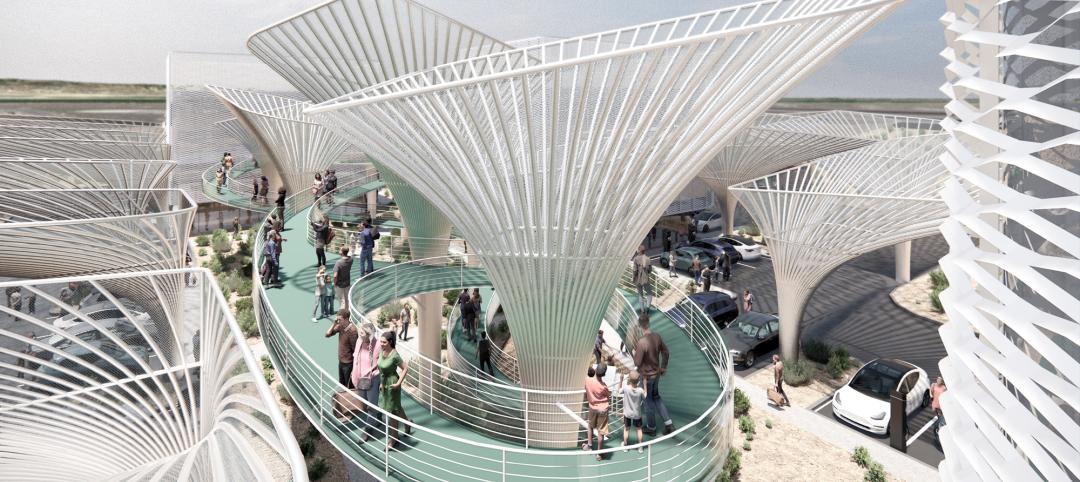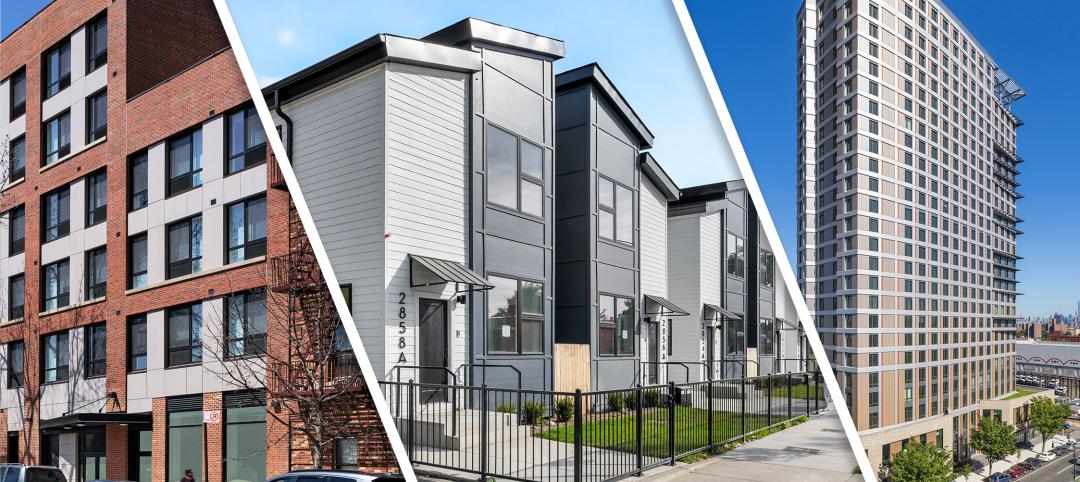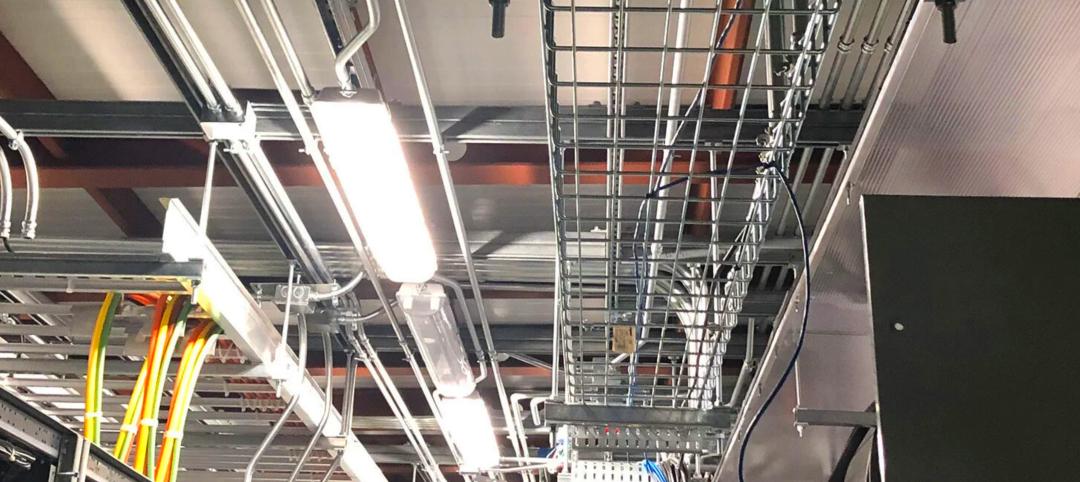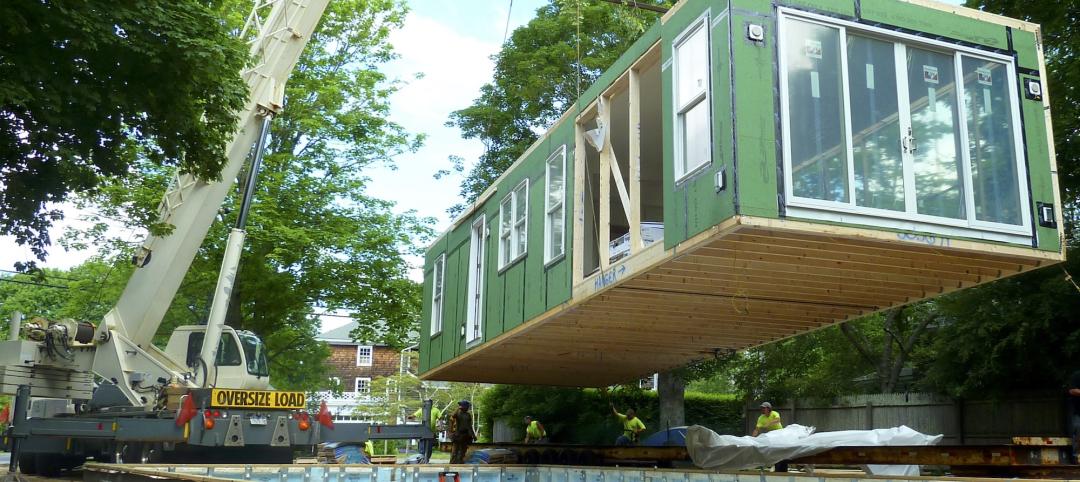More than a half-million Americans are homeless, according to estimates by the World Population Review, which cites the lack of affordable housing among the main causes.
Some advocates for the unhoused contend that this estimate vastly undercounts the actual number. Even in Vermont, with one of the lowest homeless rates in the nation, the problem is escalating. In Burlington, its largest city, the number of homeless went from 261 in 2020 to 700 in 2021, and has stayed elevated, according to the city’s estimates. One in 10 of Burlington’s homeless population is subsisting on the streets.
In December 2021, Burlington’s Mayor Miro Weinberger issued a five-year, 10-point action plan to address his city’s homeless crisis. Among those points was a call to build 30 shelter pods and related infrastructure. Two months later, the city council allocated $1.5 million in American Rescue Plan Act money to pay for the pods, plus additional funding for a community resource center.
In January 2023, Burlington’s Emergency Shelter Community, located on what once was a 0.55-acre municipal parking lot, was preparing to open. The community consists of 25 64-sf shelter pods produced and assembled by Pallet Inc. of Everett, Wash. Five more shelters are provided by a local manufacturer, Up End This, which developed its pods in coordination with the city.
Each “sleeping cabin,” which accommodates one or two people, includes a locking door, fold-up bunk, shelving, lighting, and heating. The shelters provided by Up End This include a desk and chair, and air conditioning. (While it’s not part of the Burlington project, Pallet also makes a 100-sf model that can accommodate up to four unhoused or displaced people.)
Burlington’s shelter village is supported by community spaces supplied by KBS Builders, a Maine-based modular builder. One building contains six full bathrooms, and the other offices, a kitchen, laundry, a gathering/eating area, and space for services. Samantha Dunn, the city’s Community Works Assistant Director, tells BD+C that the two community buildings are designed to meet high-performance energy standards, thanks in part to a donation of a minotaur unit that provides heating, cooling, and ventilation in the bathrooms; and the addition of solar panels provided by Harvestar with funding from the Vermont Low Energy Trust for Electricity. The buildings will be net-energy positive.
The city paid Pallet $11,800 per shelter, which included a cold-weather upgrade, shipping, and assembly services. Pallet’s claim to fame is that it can assemble a shelter in less than one hour.
Pallet Inc.'s modular pods for the homeless
Founded in 2016, Pallet is an offshoot of the green construction company Square Peg Fabrication, also in Everett, and was started by Amy and Brady King. As a Public Benefit Corporation, Pallet uses its profits to expand the impact of its twofold mission: to end homelessness, and to help the homeless find employment with Pallet, which hires people who are engaged in recovery—more than half of its employees have experienced homelessness, substance abuse, or the criminal justice system.
Since its founding, Pallet has delivered 2,800 shelter pods in 16 states and 60-plus cities. In the last week of December 2022, it was scheduled to start its 100th project, a 40-plus-pod village in the state of Washington that Pallet would assemble in two days, says Katya Hill, Pallet’s Director of Marketing and Communication.
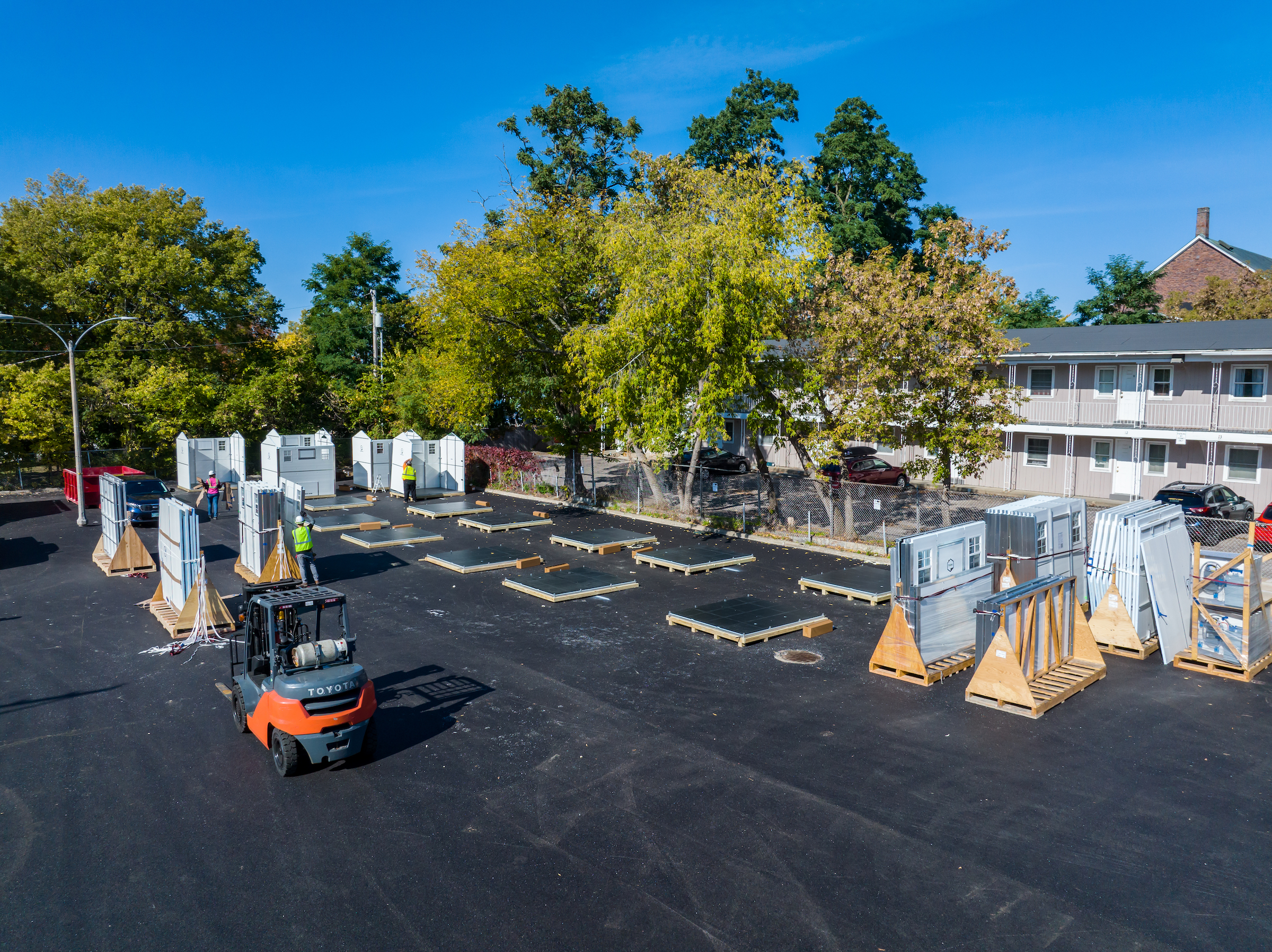
Hill tells BD+C that Pallet views homelessness as more of a social dilemma than a housing shortage problem. She also points out that Pallet is selling shelters, not homes. The shelters, she explains, “are part of a transition, a journey” that ideally leads to some semblance of economic, familial, and mental stability as steps toward permanent housing.
What Burlington is opening, says Dunn, is temporary emergency shelter, which will be operated by a team from Champlain Housing Trust. Per zoning requirements, guests can reside in a shelter for up to 180 days, with the option for a 60-day extension. As part of its action plan to combat homelessness, Burlington has executed memoranda of understanding with the Champlain Valley Office of Economic Opportunity’s CORA team, Turning Point Center of Chittenden County, Community Health Centers of Burlington, and Vermonters for Criminal Justice Reform for onsite services and support. The city continues to work with other nonprofits and faith-based groups to provide basic need items to shelter residents. And it has executed a contract with CVOEO for site-based navigation and service coordination.
Dunn says the city has designed and permitted this site to be in place for three years.
There are always displaced to be sheltered
This year, Pallet—which already enforces what HIll calls “dignity standards” that require its customers to purchase at least five shelters, and provide villages with lighting, security, and social services—will be promoting and pushing its “advisory services” to support the transition from shelters to permanent housing, including food, clothing, transportation, healthcare, and job placement.
Hill acknowledges that Pallet’s mission to end homelessness might sound “grandiose” to some. But she insists that Pallet’s founders would like nothing better than for their company to be put out of business because homelessness became a thing of the past.
That doesn’t mean, however, that the need for shelters would end. Hill points to the millions of people around the world who are displaced by natural disasters, war, and other unexpected events, and who need immediate and safe shelter, as well as medical, food and educational services, until their circumstances are mitigated. Bridging that gap with rapid-response solutions will continue to fuel Pallet’s purpose, says Hill.
Related Stories
Steel Buildings | Apr 6, 2023
2023 AISC Forge Prize winner envisions the gas station of the future
Forge Prize winner LVL (Level) Studio envisions a place where motorists can relax, work, play, shop, or perhaps even get healthcare while their vehicles charge.
Modular Building | Mar 28, 2023
Volumetric Building Companies, a modular manufacturer, designer, and contractor, looks to expand its global presence
The firm wants to break down geographic and regional variances that might impede delivery of its product.
Modular Building | Mar 20, 2023
3 ways prefabrication doubles as a sustainability strategy
Corie Baker, AIA, shares three modular Gresham Smith projects that found sustainability benefits from the use of prefabrication.
Building Tech | Mar 14, 2023
Reaping the benefits of offsite construction, with ICC's Ryan Colker
Ryan Colker, VP of Innovation at the International Code Council, discusses how municipal regulations and inspections are keeping up with the expansion of off-site manufacturing for commercial construction. Colker speaks with BD+C's John Caulfield.
Affordable Housing | Mar 14, 2023
3 affordable housing projects that overcame building obstacles
These three developments faced certain obstacles during their building processes—from surrounding noise suppression to construction methodology.
AEC Innovators | Mar 3, 2023
Meet BD+C's 2023 AEC Innovators
More than ever, AEC firms and their suppliers are wedding innovation with corporate responsibility. How they are addressing climate change usually gets the headlines. But as the following articles in our AEC Innovators package chronicle, companies are attempting to make an impact as well on the integrity of their supply chains, the reduction of construction waste, and answering calls for more affordable housing and homeless shelters. As often as not, these companies are partnering with municipalities and nonprofit interest groups to help guide their production.
Multifamily Housing | Mar 1, 2023
Multifamily construction startup Cassette takes a different approach to modular building
Prefabricated modular design and construction have made notable inroads into such sectors as industrial, residential, hospitality and, more recently, office and healthcare. But Dafna Kaplan thinks that what’s held back the modular building industry from even greater market penetration has been suppliers’ insistence that they do everything: design, manufacture, logistics, land prep, assembly, even onsite construction. Kaplan is CEO and Founder of Cassette, a Los Angeles-based modular building startup.
Affordable Housing | Feb 15, 2023
2023 affordable housing roundup: 20+ multifamily projects
In our latest call for entries, Building Design+Construction collected over 20 multifamily projects with a focus on affordable housing. Here is a comprehensive list of all projects in alphabetical order.
Data Centers | Feb 6, 2023
Modular electric rooms are the new normal
Southland Industries breaks down the prefabrication benefits of Modular Electric Rooms (MERs).
Multifamily Housing | Feb 3, 2023
HUD unveils report to help multifamily housing developers overcome barriers to offsite construction
The U.S. Department of Housing and Urban Development, in partnership with the National Institute of Building Sciences and MOD X, has released the Offsite Construction for Housing: Research Roadmap, a strategic report that presents the key knowledge gaps and research needs to overcome the barriers and challenges to offsite construction.


